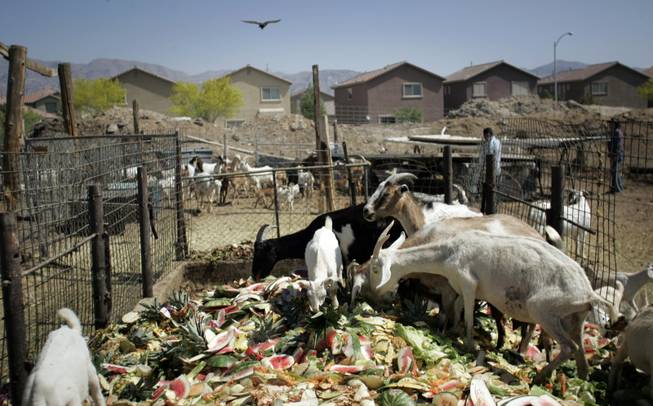
Goats feed on leftover fruit rinds from Strip casino buffets at RC Farms in North Las Vegas.
Thursday, June 18, 2009 | 2 a.m.
Sun Archives
- Countering Vegas' reputation (5-3-2009)
- Metro rethinks 'Don't feed homeless' (4-14-2009)
- Growing homeless settlement vexes business, Goodman (4-3-2009)
- LV City Council addresses homeless issues (3-18-2009)
- Despite pressing needs, wishes are modest (12-22-2008)
- Annie Wilson, Metro Police's liaison to the homeless (12-10-2008)
- First things first: For homeless, a home (4-22-2008)
Come July 1, Kathia Pereira’s family business won’t have to toss up to 1,000 rolls and loaves of bread into the trash every week.
A new state law, which she helped write, takes effect on that date, protecting donors of perishable food from liability.
It will allow Bon Breads Baking Co., the business she owns with her husband, Carlos, to give bread to organizations such as Three Square food bank instead of throwing it away.
“For a long time, my husband and friends in the business wouldn’t donate bread and other food because they were afraid of lawsuits,” Pereira said. “Now we don’t have to worry.”
The need for such a law comes from “restaurants and other businesses throwing away so much, and there being so much need,” she added.
Julie Murray, CEO of Three Square, the valley’s main food bank, welcomed the law. Her organization, which gives food to 250 agencies and 144 schools each week, has gone from dispensing 10.7 million pounds of food in 2008 to 8 million pounds in just the first five months of this year. In the course of 2008, the organization saw food pantries go from feeding 10,000 families to feeding 40,000 families.
In that context, “if there’s a barrier to donating food, and we can change it, we should,” Murray said. Three Square has 10 refrigerated trucks used to recover perishable foods that sit ready for increased donations.
Pereira said she hopes owners and managers of restaurants, bakeries and buffets overcome their long-held “paranoia” over liability. She said many may still be unaware of the law.
Van Heffner, president of the Nevada Hotel and Lodging Association, isn’t optimistic that resorts will immediately start donating perishable food. The association’s 250 members represent 150,000 rooms statewide, and none of its members has contacted Heffner about the pending change in the law, he said.
“I would be surprised if it produces a change in behavior, since there is still fear of risk, of accidents,” Heffner said.
Currently, some hotels and casinos send their waste food to RC Farms, a North Las Vegas business — 600 to 800 tons of it a month, according to Tina Holtz, administrative assistant. It’s unclear, however, how much of that might be suitable for people to eat.
Rob Stillwell, vice president of corporate communications for Boyd Gaming, said Tuesday that his company is examining the new law but hadn’t made a decision about how to react.
Though hotels and casinos might be the biggest players in the state’s service economy, and buffets their most visible food business, Pereira said getting small and medium-sized restaurants and bakeries to donate more food is her main goal.
“There’s so much out there besides buffets,” she said.
Katherine Jacobi, president of the Nevada Restaurant Association, said she thought restaurants in her organization would likely take advantage of the law to donate food.
Matt Silverman, a corporate chef at six area restaurants, including Vintner Grill, said the food his restaurants throw away could feed up to 100 people a week.
“In the past, you’d be careful of what you do, since if you give food to anyone, they can turn around and sue you,” Silverman said. “And this is not right, because so many people are hungry.”
Now, he said he would tell staff how to separate food that can be properly maintained and delivered to area nonprofit organizations, and add that chore to the daily routine at his restaurants. He said he doesn’t intend to write off the donations on tax returns and instead considers the act a case of doing the right thing.
“The driving force is, you walk by the trash can and it’s just full of waste. That’s just wrong.”

Join the Discussion:
Check this out for a full explanation of our conversion to the LiveFyre commenting system and instructions on how to sign up for an account.
Full comments policy